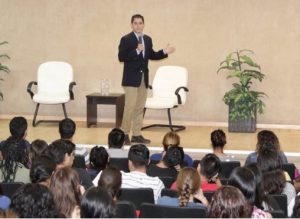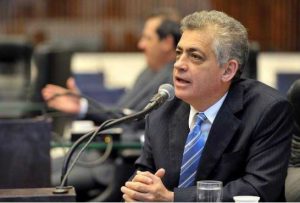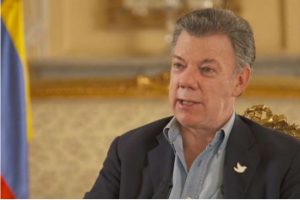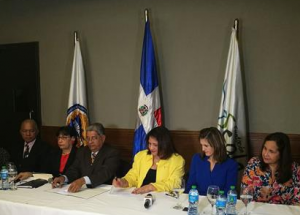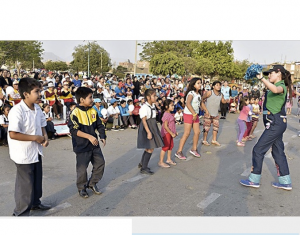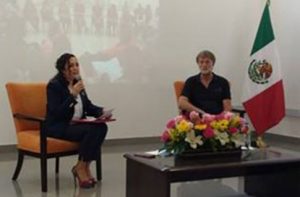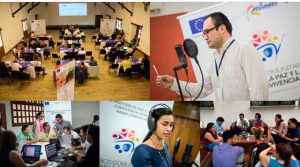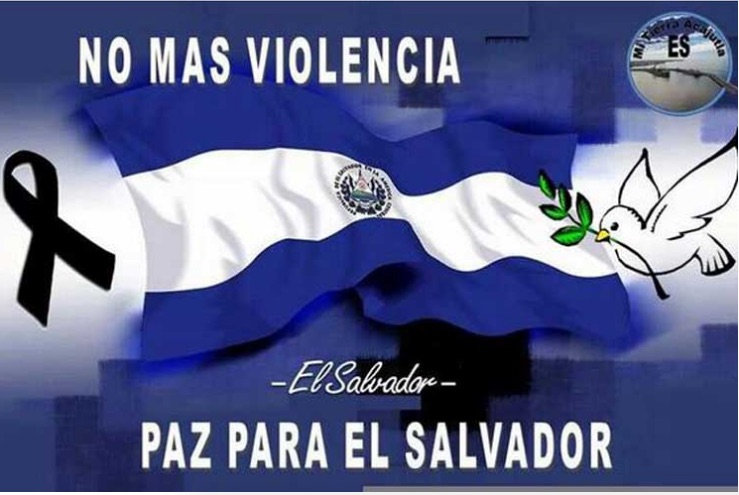FREE FLOW OF INFORMATION
Press release form the 16th World Nobel Peace Prize Summit (translated by CPNN)
With their final declaration, gathering their thoughts and messages to the world, the 30 or so laureates participating in the 16th World Summit of Nobel Peace Laureates formally closed their meeting, which for the first time took place in Latin America.
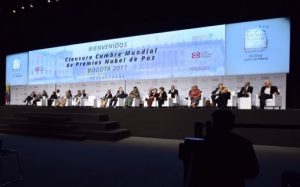
Click on photo to enlargeAt the closing ceremony of the Summit, held on Saturday, February 4, at 5:30 p.m. in Corferias, their Peace Prize was presented as a recognition to an important world leader for his Actions oriented to peace; as well as the Social Activist Medal for a Colombian leader, and the Social Transformation Award for a youth project that promotes positive change on a local or global scale.
Culture, as an integral and transversal part of this Summit, was also present at the closing ceremony, with presentations by the Bogota Philharmonic Orchestra, artists César López, Marta Gómez and other special guests that surprised the audience.
FINAL DECLARATION
We, the Nobel Peace Prize laureates, gathered in Bogota to promote world peace and support the efforts of the Colombian people’s to achieve a just and lasting peace, welcome President Juan Manuel Santos to the Nobel family. We congratulate him on the agreement reached to end the internal armed conflict of 52 years. We thank the people, the Colombian civil society, and in particular the Chamber of Commerce of Bogotá, for their extraordinary support for this Summit.
We are also here in Colombia to share with the Colombian people our own experiences in building peace and to seek a consensus on the fundamental principles that should guide the paths that lead to it.
We welcome the recent signing in November 2016 of the agreement between the Colombian Government and the FARC guerrillas, which ended the last and longest armed conflict in the Western Hemisphere, a conflict that left more than 8 million victims and displaced persons, as well as more than 220 thousand dead.
We highlight some characteristics of the peace process in Colombia, which can be taken as lessons for other conflicts to be resolved in the world:
– The positive and negative experiences of other processes were considered and taken into account.
– The negotiation started from a fundamental postulate: central to the solution of the conflict is the claim and guarantee of the rights of the victims to the truth, justice, reparation and non-repetition.
– An innovative model of transitional justice was achieved that, while respecting international standards, seeks to achieve maximum justice without sacrificing peace.
– The process was carried out in an environment of discretion, patience and seriousness, with periodic communications to the media, avoiding the pressure to produce news or results every day.
We call on the international community to accompany and support the implementation of the peace process in Colombia. This includes ensuring the presence of the State and its services in areas most affected by the conflict; demining of the territory; implementation of the transitional justice system; rural development programs, replacement of illicit crops and reparation for victims; the fight against violence generated by criminal gangs, such as those formed by former paramilitaries, and the reincorporation of ex-guerrillas into civilian life, including the participation of FARC in the political process, once disarmament has been completed.
The agreement to terminate the conflict in Colombia has been the best news of peace on the planet in a long time. That is why, as laureates of the Nobel Peace Prize, we pledge to support the consolidation of that peace, for the benefit of Colombians, the Latin American region and the world.
We also receive with special consideration “The Charter of Colombia: 10 Principles for Peace”, which President Santos has proposed to this Summit for support by his fellow laureates and for international dissemination.
We are confident that the example of Colombia will inspire peoples who face other conflicts to persist in their efforts to find a just and lasting peace.
Challenges to world order and peace have been increasing in recent years and represent a huge challenge for the international community and multilateral institutions. We are deeply concerned about the threat to global cooperation of the new wave of populism, exclusionary nationalism and protectionism. The threats facing humanity can only be addressed if we continue to cooperate globally.
The greatest existential threats to humanity today are climate change and environmental degradation, and the continued existence of more than 14,000 nuclear weapons. The arms race, the continuing wars, the dictatorships, the terrorism – including the terrorism of State -, in their diverse facets and denominations, have sowed and continue to sow death and pain in many countries. We recognize that terrorism can be better combated if social justice, democratic institutions and good governance are guaranteed. The war in Syria and the drama of its population is a wound in the consciousness of humanity that does not stop bleeding. The crisis of refugees and migration continues to escalate. The various migratory waves that we have experienced in recent decades require an unprecedented effort of human solidarity and long-term strategic planning. We must be on our guard to avoid politicizing humanitarian aid. We express our extreme concern about the bombing of hospitals and schools. Other global crises, such as endemic poverty, social injustice, child labor, urban violence, sexual violence against women and children, trafficking in persons, drug trafficking and the devastating effects of the war on drugs continue to claim victims In various regions of the world, and impede sustainable development. In the face of these threats and challenges facing peace, we issue a CALL TO ACTION by the international community, by governments, civil society, youth and the private sector – to:
(Article continued in the column on the right)
(Click here for the original version of this article in Spanish)
Question related to this article:
Where in the world can we find good leadership today?
(Article continued from the column on the left)
* Implement the 2015 Paris Agreement on Climate Change, and advance a coherent global strategy that will ensure the long-term protection of our precious planet;
* Work for inclusive development and sustainable peace, addressing the root causes of poverty and war, giving priority to the United Nations Agenda 2030 for Sustainable Development and its 17 Sustainable Development Goals, and urge the international community to allocate the necessary financial resources for its implementation;
* Renew the vision of a world without nuclear weapons and support the urgent negotiation of a new treaty to prohibit them, leading to their complete elimination;
* Confirm the need to eradicate other weapons that particularly affect the civilian population, such as anti-personnel mines and cluster munitions, as well as to preemptively prohibit fully autonomous weapons, and to control the possession and use of small arms;
* Advance in the development and implementation of coherent and interrelated policies that promote a harmonious and sustainable development of our societies and that generates peace, prosperity and well-being for all – particularly for marginalized children, young people and women -, emphasizing the importance of reducing inequality;
* Work on the compelling evidence that our world will only achieve higher levels of peace, prosperity and development if the rights of women, children and minorities are reflected in peace processes, public policies and budget allocations with clear commitments that lead to more inclusive leadership;
* Promote integrated and inclusive policies that generate productive and quality education and employment that benefit young people, women, victims and those displaced by violence, who are reintegrated into society after a peace process, as well as those discriminated against for ethnic, racist, religious, gender, disability or any other reasons, so that they can be incorporated into the labor force; We call upon States to combat hate speech based on any of these motivations;
* Call on all sectors to make concerted action to end human trafficking, modern slavery, sexual exploitation, child labor and all forms of violence against women and children;
* Advance concerted actions at the global, regional, national and local levels to combat drug trafficking, narco-politics and corruption, and accelerate the process of civil disarmament, always within parameters of protection and guarantee of human rights; We must not allow the criminalization of human rights defenders and we must resolutely oppose new forms of racism, discrimination or xenophobia;
* Promote campaigns and program development in which youth, teachers, civil society, social and technological networks take a responsible and active part in order to strengthen a culture of peace;
* Urge States to include public policies that promote and strengthen education for peace;
* Develop a complete, modern and effective operational peace architecture, including improving the means for resolving international disputes and disputes, for sustainable peace and for advancing a broad, common and inclusive strategy to end conflicts, war and the threat of war;
* Defend and revitalize the United Nations, strengthening the supremacy of law at the international level and at the level of the member countries of the organization, and condemning impartially and forcefully all violations of human rights, violations of international humanitarian law, repression and persecution of peaceful opposition, and the massacres of civilians carried out with impunity; We call upon States and the international community to ensure the rule of law;
We invite the States, peoples and religions of the world to recognize and understand the interdependence between people, communities and nations, in a sense of unity, compassion and solidarity. Only in this way can we transform the Earth – the common home of the human family – into a world in peace.
Nobel Peace Laureates who confirmed their participation in the World Summit of Nobel Peace Laureates in Bogota:
Lech Wałęsa
Óscar Arias Sánchez
Rigoberta Menchú Tum
José Ramos-Horta
Jody Williams
David Trimble
Shirin Ebadi
Mohamed El-Baradei
Leymah Gbowee
Tawakkul Karman
Kailash Satyarthi
Juan Manuel Santos
Click
here to see a history of the World Summit of Nobel Peace Laureates.
